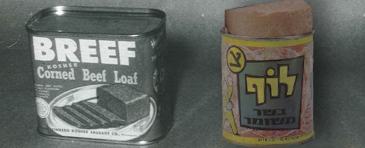
On Nov. 14, 2011, the Israeli media outlet Ynet sounded the death knell for a staple of the country’s military diet: Loof, Israel’s kosher alternative to Spam.
Thanks to a policy of mandatory conscription, the Jewish state in effect, had been force-feeding Loof — a colloquially corrupt short form of "meatloaf" — to its citizens since the nation’s founding. The resulting trauma alluded to in Gil Marks’ "Encyclopedia of Jewish Food" (2010) is understandable:
Many Israeli soldiers insist that Loof uses all the parts of the cow that the hot dog manufacturers will not accept, but no one outside of the manufacturer and the kosher supervisors actually know what is inside. (Marks 369)
Loof anecdotes are ubiquitous and diverse. A personal favorite that emerged while researching this topic was a current 20-year-old Israeli soldier who was handed a can of meat dated 1988. “It wasn’t bad,” the soldier said. “It just felt weird eating something that was older than me.”
“Loof has a worse name than it deserves,” Israel’s national archivist, Yaacov Lazownik, responded in an e-mail. “Everyone I’ve mentioned this to recently comes up with a story along the lines of, ‘The Loof was usually awful, but we had this one guy who knew how to cook it so that it was delicious …’ "
[[READMORE]]
Canned meats and the military have enjoyed a symbiotic relationship for at least a century — ditto for kosher canned meats.
“In the late 1940s,” begins the entry for Loof in Marks’ encyclopedia, “the Israeli Defense Forces developed a kosher form of the British ‘Bully beef.’ "
Bully beef, a generic term used to describe canned meat in Britain, was served to British troops as early as the Second Anglo-Boer War at the turn of the 19th century. In an unrelated development around that time, protests by animal rights groups in Germany and Switzerland led those governments to consider prohibiting the practice of shechitah, Jewish ritual slaughter that distinguishes kosher meat.
In 1894, Dr. Isaac Dembo, a Russian physician, began to study and publish works about the science of shechitah. Dembo set out to demonstrate that shechitah should not merely be tolerated; he argued that it represented an improvement over existing slaughter methods in terms of hygiene and humane treatment of animals. Five years later the Hebrew-language periodical HaTsefirah extolled Dembo’s efforts:
And who doesn’t know that from the moment the value of schechita was made known to all by the books of Dr. Dembo, a law was given in Spandau next to Berlin by the minister of war to prepare canned meat for troops only from animals slaughtered through shechita?
As is the case with many industries, wartime proved to be a boon for canned meats. Introduced in 1926, Hormel Spiced Ham — better known as Spam — originally marketed its canned meat based on the novelty and convenience that it did not require refrigeration.
“This didn’t make the ground meat more attractive,” Israeli writer Sagi Cohen commented in a 2010 tongue-in-cheek magazine article. “Mountains of these cans were piling up in the company’s warehouses, until in 1939, a miracle happened to [Hormel]: Hitler invaded Poland.”
Just as Spam benefited from the war effort — supplying 15 million cans weekly to Allied forces — the demand for kosher canned meats also began to increase. The wartime role of kosher canned meat was first mentioned by JTA in a 1942 article about Hadassah sending food to Palestine from the U.S. Before the war, JTA also had a couple of references to canned meat: During a 1930 taxation dispute between a Jewish slaughterhouse in Palestine and the British Mandate, “the use of canned meat was resorted to by some while patients in the hospitals suffered from the lack of fresh meat.” In 1933, JTA reported that kosher canned meat would not be on the menu of rations during the Depression.
The real boom in kosher canned meats took place when kosher canned meat became a crucial component of Jewish organizations’ relief packages for Europe’s Jewish war victims. JTA first noted this at the end of 1945, when the American Jewish Joint Distribution Committee made canned meat available in DP camps in Germany.
In May 1946, the Chicago Kosher Sausage Manufacturing Company — a Winnipeg-based company — registered a word mark with the Canadian patent office for a canned meat product called Breef.
Neil Feinberg, 74, the last owner of the Feinberg Sausage Co. in Minneapolis, says he’s well familiar with Breef.
"That was the best quality product of the bunch” among kosher canned meats, he says.
“Canned corned beef is like Spam — very similar texture,” explained Feinberg, 74, who is retired and living in Palm Springs, Fla. “Only it was made of beef and had a corned beef flavor to it,” an effect achieved by using the same seasoning from the company’s regular corned beef.
Kosher canned meats weren’t limited to corned beef. Feinberg, whose company was started in 1890 by his great-grandfather, a Russian rabbi, as a kosher salami operation, also produced canned salami. In Pittsburgh, the Jan. 2, 1953 edition of the Jewish Chronicle heralds the arrival of a new product by the Penn Kosher Food Company: a 4 1/2-pound “whole chicken in a can.”
But Breef, Feinberg says, was top of the line.
Whether the Breef sold in Minneapolis was the same as the one sold in Winnipeg is unclear. But certainly it’s feasible: Winnipeg and Minneapolis are about 450 miles apart, and the Averbuch family that owned Chicago Kosher were friends of the family, Feinberg recalls. Other products, like sliced beef bacon, were made under both labels.
Whatever the case, Breef began selling fast at home and overseas. Early in 1947, the Feinberg Sausage Co. announced that it would be introducing Breef to the Minneapolis-St. Paul market with a 13-week ad campaign through radio and display ads, along with a recipe contest. According to Feinberg, the product eventually was distributed in North Dakota, South Dakota, Iowa and later California.
On March 7, 1947, JTA reported a shipment from the Canadian Jewish Congress, the United Jewish Relief Agencies of Canada and the JDC that contained 1 million pounds of kosher canned meat designated for Jewish war victims in Europe. “The meat is being canned in Winnipeg according to Jewish dietary laws,” said the report.
In a collection of Chicago Kosher Sausage’s documents — located today in the Jewish Historical Society of Western Canada — a Nov. 27, 1947 letter from the executive director of CJC’s Western Division offers anecdotal insight as to how the product was received:
One of the tins of corned beef was sent to a Hungarian Jew who, you may be pleased to learn, liked it so much that he wants more. He also indicated that parcels with other food-stuffs would be gratefully accepted.
In 1950, JTA reported that this "one Winnipeg company" was doing $2.5 million worth of kosher canned meats exports to Israel.
Alas, the glory days of kosher canned meat were relatively short lived following the war. One year before the May 1950 JTA article was published, a distress signal was sent in the form of a letter from A. Averbuch to the kosher supervising agency, the Va’ad Ha’ir of Winnipeg:
We exceedingly regret to advise you that due to lack of export business in our canning department, we are compelled to be more or less shut down for an indefinite period.
Due to the above circumstances, we are not in a position to pay our present monthly rate to you, and therefore would appreciate a private meeting with us to discuss the new arrangement.
A letter of similar tone sent to the Va’ad Ha’ir on July 13, 1951 described a “quite desperate” situation, where 75 percent of its 52 employees were laid off. In contrast to a letter sent two months earlier, “the past several months we have not produced anything in Canned Meats, nor is there anything in the offing,” wrote Averbach.
One factor that may have contributed to the demise of Winnipeg’s kosher canned meat operation was increased competition in Europe. A July 23, 1948 dispatch announcing the opening of an Israel trade post in London notes that the Jewish state had already been bartering citrus fruit for Ireland’s canned meat. The annual report of Ireland’s minister of agriculture dated 1948-1949 notes that approximately 27 percent of canned stewed steak shipped to Europe was “Kosher canned stewed steak for the relief of distressed Jews,” adding that “the tinplate for the cans was supplied by the Jewish Organisation concerned in the distribution of the Kosher meat.” In 1949, an Israeli rabbi set out to oversee a kosher meat-canning plant in Poland.
As described in the book "Coming of Age: A History of the Jewish People in Manitoba," the Winnipeg company went out with a heartwrenching thud that reverberated throughout the Jewish community. In 1970, 90 percent of a beef shipment destined for Winnipeg’s Chicago Kosher plant was discovered to be non-kosher meat from New Zealand. While the company and owner were ultimately assessed a small fine, their refusal to apologize tainted whatever fond memories of meat might have otherwise lingered.
In Minneapolis, the Feinberg family business ceased canning operations in 1955 due to a lack of demand. Six years later the company was sold to Sinai Kosher.
“The problem with Feinberg Kosher Sausage,” said Feinberg, “was that we were in a small market. It was difficult to compete against big kosher sausage factories in Chicago,” which had direct access to slaughterhouses.
“But we had a good brand,” he added proudly.
****
The need to replace Loof was accelerated by the realization in 2009 that the longtime manufacturing company Richard Levy, which had declared bankruptcy early in the 2000s, had stopped producing new cans. Upon making the discovery, the military realized it was now running solely on inventory.
After a year of market testing with soldiers and making packaging refinements, the IDF announced last week that “ground meat with tomato sauce” was selected among three varieties of kosher meals ready-to-eat (MREs) to replace Loof. Kosher MREs, which have been produced for the U.S. military since 1996, come with special aluminum bags that cook contents through chemical reaction upon contact with water.
With the sun setting on Loof — the last great vestige of kosher canned meats — Jewish readers can look to Africa for the future of traditional canned meats:
Over the summer, the Kenya Meat Commission designated 600,000 tins of halal canned corned beef for famine relief.
[Photo courtesy of the Jewish Historical Society of the Upper Midwest]
JTA has documented Jewish history in real-time for over a century. Keep our journalism strong by joining us in supporting independent, award-winning reporting.





